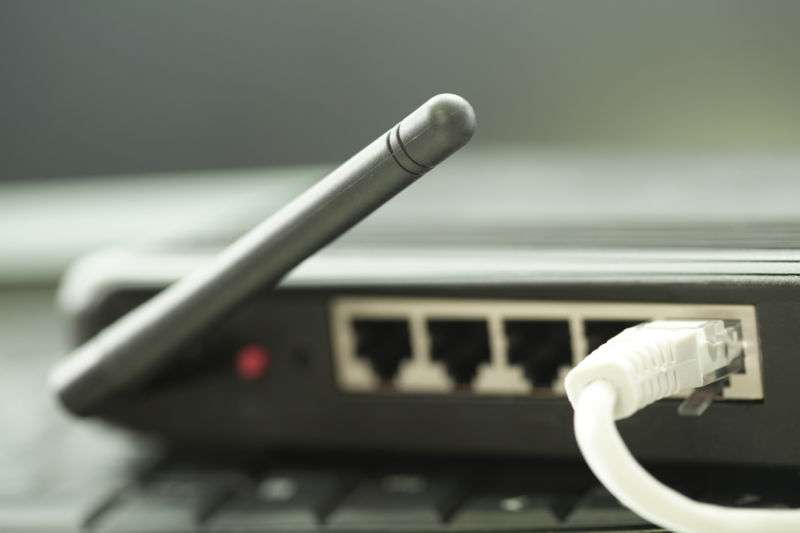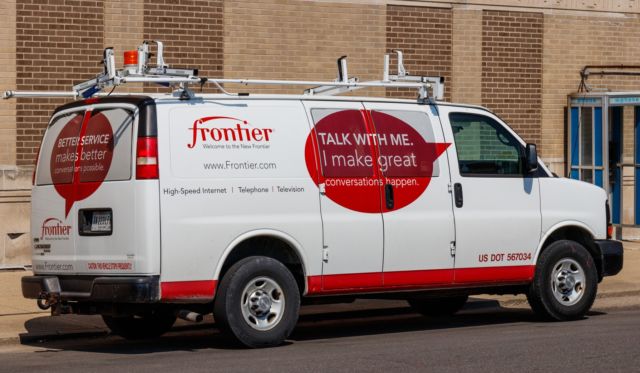
Frontier customer bought his own router—but has to pay $10 rental fee anyway

Buying your own router instead of renting one from an ISP is one of the few reliable ways to save money on a broadband bill.
But what if you buy and use your own router and the broadband provider still charges you a $10-per-month rental fee? That’s the bitter reality for Frontier Communications customers such as Rich Son of Texas.
Son has been a Frontier customer since April 2016 when Frontier purchased Verizon’s wireline networks in Texas, California, and Florida. Prior to that, he was a Verizon FiOS customer and purchased Verizon’s FiOS Quantum Gateway router for $200 in order to avoid monthly rental fees.
Son and his wife, Karen, still use that FiOS router with their Frontier service at their home in a suburb near Dallas, and Son says Frontier never provided him with another router. But Frontier started charging them $5 a month for what’s listed as a “Wi-Fi Router” fee on their bill, and the company raised the router fee to $10 a month in April of this year. Including the router rental charge, the couple pays $90 a month for a 150Mbps broadband plan with no TV or phone service.
Using the FiOS router to avoid rental fees “worked well for me until the takeover happened with Frontier and I began getting charged for using my own equipment,” Son told Ars. “I have continued to call Frontier and was repeatedly assured that the fees will be taken off my bill.”
But that didn’t happen. While Son was able to get three months’ worth of credits at one point last year, he said he’s otherwise had to pay the $5 and now $10 router fees every month since Frontier bought Verizon’s Texas network.
Complaint to FCC goes nowhere
Son filed a complaint with the Federal Communications Commission; Frontier responded to the complaint but stuck to its position that he has to pay the fee. A voicemail that Frontier left with Son and his wife said the company informed the FCC that “the router monthly charge is an applicable fee, and it will continue to be billed.”
Another voicemail from Frontier told them they can avoid the monthly rental fees if they purchase a Frontier router.
“We can reimburse you if you purchase a Frontier router. We cannot reimburse you if you have a Verizon router—we are not Verizon,” the voicemail said. “You can choose to use your own router, however you will be still charged the monthly fee… the difference is we do not service the router that you choose to use.”
The FCC’s complaint process can help customers in some cases but doesn’t require the provider to do anything other than respond within 30 days. The FCC complaints team told Son in an email, “We reviewed the provider’s response and based on the information submitted, we believe your provider has responded to your concerns.”
With FCC Chairman Ajit Pai having deregulated the broadband industry, there’s little to no chance of the commission taking action to stop fees like the one charged by Frontier.
“It’s $10 today—but how much will it cost us tomorrow?” Son said. “I’d consider letting it go if their customer service blew me out of the water, but they’ve been terrible ever since Verizon forced Frontier on us.”
Frontier defends router charge
We contacted Frontier about Son’s case. The company confirmed that it refuses to stop charging the Wi-Fi router rental fee even when customers use their own router and claimed it does so in order to cover higher support costs for customers like Son.
Frontier told Ars:
Our Frontier Residential Gateway (router) is Frontier equipment provided with every service order and specifically designed to work with our service. Our advertising and our residential Internet terms and conditions make clear that our service includes equipment charges, such as the router charge, and neither our advertisements nor our terms and conditions provide any exceptions. A customer may choose to use their own router, but if the customer does, our router charge continues to apply. Also, we cannot support or repair the non-Frontier equipment.
Though infrequent, when a customer chooses to use a non-Frontier router, we see increased complaints and more difficulty with troubleshooting, performing online resets, and providing simple resolutions, so it costs more to serve that customer. Therefore, if a customer uses their own router, the charge still applies to cover these costs. Frontier cannot support or repair non-Frontier equipment.
Frontier’s website states simply that “Frontier charges you a monthly lease fee for your Frontier router or modem—whether you use it or not,” and it claims that the Frontier-provided router is “the exact model needed for the peak performance of your voice, TV, and Internet services.” Specifically, Frontier uses an Arris NVG468MQ router but also notes on its website that “Frontier Internet works with a variety of routers, like the Arris NVG443B and the Netgear D220D.”
While Frontier told us that its equipment is “provided with every service order,” Son says he never received a router from Frontier. The company is literally charging him every month for a router that was never provided to him.
And while Frontier claims non-Frontier routers cause support problems, this is hard to believe in Son’s case: he is using a router specifically designed to work with the FiOS network and which continues to work more than three years after Verizon sold the FiOS network to Frontier. Son told Ars that he hasn’t needed to call Frontier about any problems with his router, though he has called the company plenty of times to dispute the router rental charge. Customers that buy their own routers are often more tech-savvy than the general public and are thus able to troubleshoot problems themselves, Son noted.
“It’s in Frontier’s interest”
To defend the fee, Frontier is trying to make the simple act of hooking up a router seem more complicated than it really is.
“I think it’s in Frontier’s interest to make it seem like this is some weird specialized equipment that communicates with their backend in some advanced technical way, but that’s not true,” Senior Counsel John Bergmayer of consumer-advocacy group Public Knowledge told Ars.
With FiOS fiber service, each house is equipped with an Optical Network Terminal (ONT), which does the heavy lifting of communicating with the FiOS network. Using your own router to set up Wi-Fi is not complicated even if it isn’t officially supported by the ISP.
“This is discriminating against users who want to use their own equipment,” Bergmayer said. Since “it’s just a standard router, it’s not some proprietary network interface where there’s a good reason for it.”
Since Frontier charges the fee even when customers use their own router, the actual cost of service is $10 more than Frontier’s advertised rates, Bergmayer pointed out.
“Any time you have a fee which is not part of the advertised service but you can’t opt out of the fee and everyone has to pay it whether or not you’re using the thing [the fee is supposed to cover], then that’s just part of the service charge” and should be listed in the advertised rate, Bergmayer said.
Legal options are limited
Theoretically, the Federal Trade Commission or state attorneys general could file lawsuits against ISPs and argue that this type of fee is unfair and deceptive and therefore violates consumer-protection laws.
It would be easier to stop this kind of practice at the FCC—the US agency that exists specifically to regulate telecommunications networks. But the Pai FCC’s elimination of net neutrality rules and deregulation of broadband also got rid of rules requiring ISPs to be more transparent with customers about hidden fees. Pai’s broadband deregulation also eliminated a general prohibition against unjust or unreasonable prices and practices. In short, the FCC gave up most of its authority to regulate broadband providers.
“For categories of behavior that are never OK, it’s just preferable to have a rule against it rather than having to rely on state AGs to enforce their general-purpose consumer-protection statutes,” Bergmayer said.
The FTC has to regulate many industries besides telecom. “It’s not like they have this endless supply of investigators to throw at consumer complaints,” Bergmayer said.
The FCC enforces a rule against negative option billing, the practice of charging a customer for services or equipment the customer did not affirmatively request. But that rule applies only to TV service, not broadband.
Other Frontier users fight same losing battle
Son is not alone in his frustration with Frontier. A Reddit user and Frontier customer reported the same problem in a post last year.
“When the technician was setting things up I told him I wouldn’t need the router provided by Frontier since I would use my own. He removed the router from my account and took the router with him,” the customer wrote.
Like Son, this customer was charged $10 a month for renting a router that wasn’t being used.
“After talking to four different customer service people, it seems that the router rental is part of the package and can’t be removed,” the customer wrote. “Which seems ridiculous to me since, if I want to keep my Internet service with them, I have to pay $10 a month for something I don’t want.”
Other Frontier customers posting in the same Reddit thread also reported that Frontier refused to waive the fee. As one customer wrote, “I feel like this is a fraudulent practice because I am being charged a rental fee for an item that I do not have possession of.”





